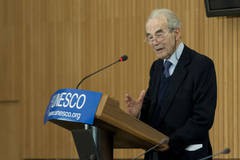
GCED Basic Search Form
Quick Search
You are here
News

The fight against antisemitism cuts to the heart of UNESCO’s role and mission to build global peace through education and the promotion of respect for others, said Director-General Irina Bokova, opening a high-level round table at UNESCO Headquarters on 6 December 2016.
Organized with the International Holocaust Remembrance Alliance, the round-table analysed the roots of antisemitic hatred, how it can be defined, its evolution and contemporary expression, as well as the best use of education, communication and culture to combat it.
In his keynote address, Mr Robert Badinter, former French Minister of Justice and former President of the Constitutional Council in France, brushed a historical overview of antisemitism, from its religious origins to the national and racial dimensions it took on in the 19th and 20thcenturies, culminating in the Holocaust.
“In and of themselves, culture, the love of art, education do not suffice to counter the fury of racism and antisemitism. We must draw lessons from this,” he stated, warning that “complacency nurtures prejudice that feeds on hatred," culminating in the Holocaust and other pernicious forms today.
Ms Bokova recalled that “hatred of Jews is an ancient hatred that has never stopped evolving over the centuries under many different guises,” ultimately leading to the destruction of nearly all European jews.
She reminded the audience that UNESCO was the sole UN agency to have a programme dedicated to teaching the history of the Holocaust as a means of promoting global tolerance and respect and preventing future genocides.
Noting that antisemitism is resurging in Europe with murderous attacks against Jews, she stressed that antisemitism was best combated with education, with the teaching and understanding of not only the Holocaust but Jewish culture and patrimony as an antidote to prejudice.
“Education has a fundamental role to play here but not just any kind of education. We need an education that really transmits the knowledge of historical facts, heritage and culture, to protect and respect the dignity of all people, their beliefs and traditions, on the basis of respect for human rights,” she said.
She commended the IHRA for its adoption of a concrete definition of antisemitism, which represents “a considerable step forward to help put precise words on a subject that demands constancy and firmness.”
Ambassador Mihnea Constantinescu, Chair of the IHRA, a network of 31 member countries, stated that “we must all identify the roots of hate, discrimination and exclusion that led to the tragedy of the Holocaust and eradicate them for good, both on the European continent and globally. This means access to education, openness to diversity, commitment to teaching young generations to respect human values and the undistorted history. Teaching young generations to denounce and reject every form of extremism, intolerance, racism or antisemitism is a necessary achievement for shaping the future”.
This set the stage for a panel discussion of experts who all concurred on the complexity of contemporary antisemitism and the role of education in countering it.
Ms Katharina von Schnurbein, the European Union’s Coordinator on combating antisemitism, stressed the importance of a holistic approach, solid legislation and understanding the positive contribution of Jews to history.
Ms Cristina Finch, from Organisation for Security and Cooperation in Europe (OSCE), outlined initiatives in place to train police and prosecutors on hate crimes, build coalitions with different communities, and to develop policy guidelines for educators, in cooperation with UNESCO.
Mr Dervis Hizarci of the Kreuzberg Initiative against Antisemitism (Germany) described pedagogical work with Arab, Turkish and Muslim youth in Germany.
Professor Steven Katz, Slater Professor of Jewish and Holocaust Studies at Boston University and Professor Dina Porat, Head of the Kantor Center for the Study of European Jewry at Tel Aviv University both described the complexity of contemporary antisemitism, historical distortions, the importance of recognizing the wealth of Jewish culture and its contribution to world history, and the need to work on a broader understanding of the phenomenon.
The event, supported by the UST Shoah Foundation, included a video presentation of the project “Countering Antisemitism Through Testimony”, by Ms Marianne Lère of the USC Shoah Foundation, UNESCO Chair for Genocide Education.
